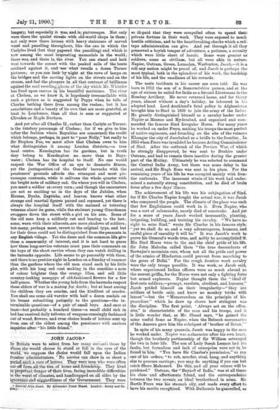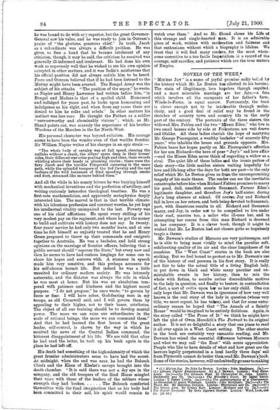JOHN JACOB.* IF Britain were to select from her many
seic:anes those by Whom she would choose to stand or fall in the eyes of the World, we suppose the skoice Would fall upon the Indian frontier administrators No service can show in so short a p.2.0d such a race of heroes. They -were Men who were often cut-off from0:the ties of home andrfriendship_ They lived in"perffetuattninger of their lives, facing incredible difficalties in the worst Of climates, and handicapped on all ii-des. by the ignorance and niggardliness of .tha- Goverinnent. They were Genera John Jamb, By Alexander Innee Shand. London : Seeley and Co. so ill-paid that they were compelled often to -spend their private fortune in their work. They were exposed to much hostile criticism, and to the heartbreaking checks which a red; tape administration can give. And yet through it all they preserved a boyish temper of adventure, a patience, a serenity which were little short of heroic. Some were greater ast soldiers; some as civilians, but all were akin in . nature. Napier, Outram, Greenalawnsclen, Warburton, Jacob,—it is a roll any nation might be proud -of, and Jacob is perhaps the moat typical, both in the splendour of his work, the hardship of his life, and the smallness of his rewards.
Thearnain incidenta in his career are soon told. He was born in 1812 the son of Somersetshire parson, and at the age of sixteen he sailed for India as a Second Lieutenant in the Bombay Artillery. He never returned home, and for thirty years, almost without a day's holiday, he laboured in his adopted. land: Lord Auckland's fatal policy in Afghanistan brought him to Sind in 1838 to join the army of the Indus: He greatly distinguished himself as a cavalry leader under Napier at Means* and Hyderabad, and organised and com- manded the famous Sind Irregular Horse. For many years he worked on under Frere, making his troops the most perfect of native, regiments, and founding on the site of the ruinous Khangur the city of Jacobabad as a bridle to the frontier.,. In 1855 when Frere was invalided he became Acting Commissioner of Sind. After the . outbreak of the Persian War, of which he strongly disapproved, he . was sent to Bushire . under Outram, and had to remain there inactive during the greater part of the Mutiny. Ultimately he was -selected to command the Central India Army, but there was some delay in his arrival, and Sir Hugh Rose was sent in his place, Fer the remaining years of his life he was occupied mainly with fron- tier outbreaks. The incessant strain of his work had under- mined a 'naturally strong constitution, and he died of bran fever after a few days' illness.
The achievement of his life was his subjugation of Sind, for if Sir Charles Napier fought the actual war, it was Jacob who conquered the people. The climate of the place was such that few Englishmen could work in it. Even Napier, who was a wilt of salamander, nearly died of sunstroke. • And yet for a score of years Jacob worked incessantly, planting, irrigating, building,' and training his cavalry. "We have no right to_ seize Sind," wrote Sir Charles iri his famous style, "yet we shall do so, and a very advantageous, humane, and useful piece of rascality it will be." It was Jacob's work to prove his- General's words trite,. and nobly he accoMplishAttit His Sind Horde tvere.to the end the Chief pride of his life. Sir John Malcolm called them "the true descendants of Seeivajee'd mOnntain rats, whom not ill the pride and power of the armies of Hindustan Could prevent from marching to the gates of Delhi" For the rough frontier work cavalry were the only troops possible. It • Was work, as Jacob said, where experienced Indian officers were as much abroad. aa the merest griffin, for the Horse were not only a fighting force but armed explorers. Napier thought them the • " ideal äf first-rate soldiers,—prompt, resolute, obedient, and. humane." Jacob prided -himself on their irregularity.," they are soldiers of battle only, and know no monkey tricks with lancess"-aabut - the " Methorandum on the principle' of his procedure" which he drew up shows hoW stringent was the discipline.. The first point, "Always act on the offen- sive," is characteristic of the man and his troops, and it is little wonder that, as Mr. Shand says, "he gained the same useful fame as Napier, when the Belooch mercenaries of the Ameers gave him the, sobriquet of' brother of Satan.''" In spite of his many quarrels, Jacob was _happy in the men he worked under. Napier was a character after his own heart, though the brotherly partisanship of Sir William estranged the two in later life. The son of Lady Sarah Lennox had his faults, but formalism and lack of enteririse, were not tsi_he "Yon have Sir Charles'i'perinissiOn," 'so ran one of his Orders, "to rob, murder, steal, hang, and anythini else to procure carriage; you may do anything if you can bnt catch Shere Mahotied. Do WS,- and - all your crimes will be pardoned:" • Outram, the- " Bayard of India," was it all times his close - and affectionate friend, and the correspondence between the two reveals an ideal brotherhood in arms. Sir Bartle Prere was his eta-Lurch ally, and made every effort to have his merits recognised. With Dalhousie he quarrelled; as
he was bound to do with ary superior, but the great Governor- General saw his value, and he was ready to join in Outram's praise of "the glorious, generous chief." In truth, Jacob as a subordinate was always a difficult problem. He was given so free a hand that he became intolerant of any criticism, though, it may be said, the criticism he received was generally ill-informed and irrelevant. He had done his own work so supremely well that he wished to see his own opinion accepted in other matters, and it was India's misfortune that his official position did not always entitle him to be heard. Frere and Outram believed that if he had been listened to the Mutiny might have been averted. The Bengal Army was the subject of his attacks. "The position of the sepoy," he wrote, as Napier and Henry Lawrence had written before him, "in Bengal and Madras is that of a spoiled child. Humoured and indulged for years past, he looks upon humouring and indulgence as his right, and when from any cause these are denied to him he sulks and rebels." In other matters his instinct was less sure. He thought the Pathan as a soldier
4* untrustworthy and abominably vicious " ; which, as Mr. Shand points out, was scarcely the experience of his brother Wardens of the Marches in the far North-West.
His personal character was beyond criticism. His courage seems to have been the wonder even of that warlike frontier. Sir William Napier writes of his charges in an epic strain :—
"The whole body of cavalry was at full speed, clearing the nullahs without a check, the riders' spurs deep in their horses' sides, their different war-cries pealing high and clear, their swords whirling above their heads in gleaming circles ; there were the fiery Jacob and the terrible Fitzgerald careering in the same path, while the splendid troopers of the 3rd Cavalry and the red turbans of the wild horsemen of Sind. speeding through smoke and dust, streamed like meteors behind them."
And all the while in his scanty leisure he was busying himself with mechanical inventions and the perfection of artillery, and
writing curiously heterodox theological treatises. He was a first-rate mathematician, and apparently metaphysics deeply interested him. The marvel is that in that terrible climate, with his laborious profession and constant worries, he yet kept his intellectual vitality unimpaired to the last. Poverty was one of his chief afflictions. He spent every shilling of his very modest pay on the regiment, and where he got the money to build and cultivate with history does not say. In twenty- four years' service he had only two months' leave, and at one time he felt himself so unjustly treated that he and Henry Green proposed to throw up their commands and emigrate together to Australia. He was a bachelor, and held strong opinions on the marriage of frontier officers, believing that a public servant should "espouse the State," but every now and then he seems to have had curious longings for some one to share his hopes and sorrows with. A stammer in speech made• him very sensitive, and this perhaps accounts for his se]f-chosen hermit life. But indeed he was a little unsuited for ordinary modern society. He was intensely autocratic, and the dictator was always the role in which he was most at home. But his was an absolutism tern-
pored with patience and kindness and the highest moral purpose. "I do not propose." he once wrote, "to govern by force or fear. I will have sober, God-fearing men in my troops, as old Cromwell said, and I will govern them by appealing to their higher, not to their baser, attributes. The object of all our training should be to develop mental power. The more we can raise our subordinates in the scale of rational beings, the more we can command them." And that he had learned the first lesson of the great leader, self-control, is shown by the way. in which he received the news of the Central Indian command, the bitteiest disappointment of his life. We are told that after he had read the letter, he took up his book again in the place he had left off.
His death had something of the high solemnity of which the great frontier administrators seem to have had the secret. At midnight, when the end was near, he had the Belooch Chiefs and the Khan of Khelat's envoys brought into the death chamber. "It is said there was not a dry eye in the company, and the old troopers of the Sind Horse mingled their tears with those of the leaders of the robbers whose
strength they had broken The Belooch comforted themselves with the fond imagination that as his body had been committed to their soil: his spirit would remain to watch over them." And so Mr. $hand closes his Life of this strange and single-hearted man._ It is an admirable piece of work, written with moderation and fairness and that enthusiasm without which a biography is lifeless. We trust that it will find many readers, for the most whole- some corrective to a too facile Imperialism is a record of the courage, self-sacrifice, and patience which are the true makers of Empire.



































 Previous page
Previous page